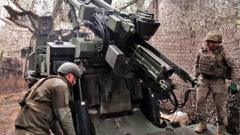As Ukraine's military confronts Russia on the battlefield, soldiers express cautious optimism towards renewed talks for peace, hoping for an end to the devastating conflict. Still, the consequences of war are ever-present, fueling doubts about potential concessions and territorial negotiations.
Cautious Optimism on the Front Lines: Ukrainian Soldiers Anticipate Peace Talks with Russia

Cautious Optimism on the Front Lines: Ukrainian Soldiers Anticipate Peace Talks with Russia
Amidst the relentless warfare in Donetsk, Ukrainian soldiers express tentative hope as diplomatic discussions with Russia commence once more, reflecting the complex realities of war and the desire for peace.
Big plumes of smoke rise on screens as Ukrainian drones survey the fraught outskirts of Pokrovsk—one of the deadliest front lines in the ongoing conflict with Russia. Here, the live feed shows the harrowing reality of war: artillery strikes on Russian positions, potentially injuring or killing enemy soldiers. Amid the desolation and destruction, soldiers from the 155th mechanized brigade showcase both the grim consequences and soldierly resolve.
In this transformed rural home, functioning as a command center, an officer known as "Kozak" reflects on the staggering loss of life: "I want to believe this would be the beginning of the end of the war," he states. His sentiment echoes a fragile, growing optimism among the troops as the first talks between Russia and Ukraine in three years convene, spurred by various international mediators.
While many soldiers remain skeptical, Kozak recognizes Russia's shift in posture: "They have refused to go into any contact since 2022… yet our efforts have successfully disrupted their supply lines." Another soldier, Yurii, once in tech, voices the collective yearning for peace tempered with grim realism: "We cannot stop this because we did not start it." He laments the deaths of comrades and the profound implications of territorial concessions.
As busy artillery positions fire what they can from advanced French-built "Caesar" guns, the toll of modern warfare becomes apparent. Rising drone usage adds urgency to their defense, with a new threat emerging in fiber optic cable drones that remain largely undetectable.
The soldiers’ hope contrasts sharply with the feelings of civilians grappling with daily trauma. Yana Melnikova mourns her son, Vladislav, a fallen drone operator, evoking heartbreak at news of peace negotiations: "It seems to me that this war is eternal... Putin's hunger for our land is insatiable." As she tends to her son's grave, she fears that peace could come at the cost of further Ukrainian sacrifice.
Each story intertwines the aspirations for a peaceful resolution with the painful realities that linger across the country. As Ukraine remains resolute in pushing back against aggressors, the emotional weight of the ongoing conflict weighs on the hearts and minds of both soldiers and civilians alike, casting doubt on whether true peace can ever be achieved.



















